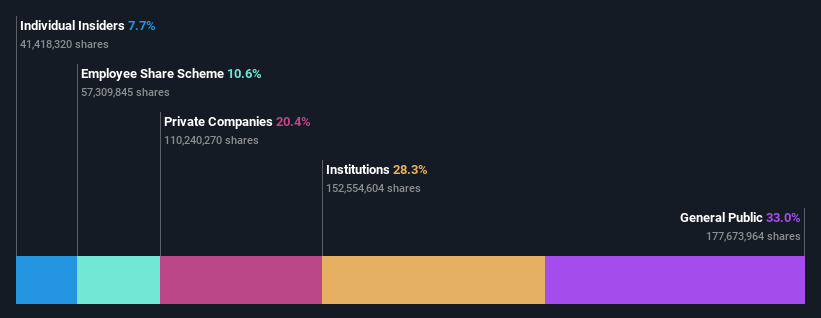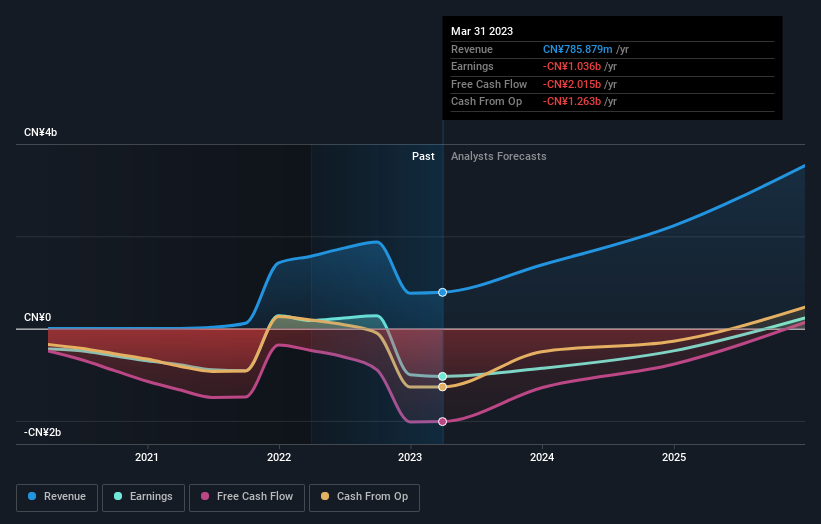Retail investors who have a significant stake must be disappointed along with institutions after RemeGen Co., Ltd.'s (HKG:9995) market cap dropped by HK$1.1b

Key Insights
- RemeGen's significant retail investors ownership suggests that the key decisions are influenced by shareholders from the larger public
- A total of 10 investors have a majority stake in the company with 52% ownership
- 28% of RemeGen is held by Institutions
Every investor in RemeGen Co., Ltd. (HKG:9995) should be aware of the most powerful shareholder groups. The group holding the most number of shares in the company, around 33% to be precise, is retail investors. In other words, the group stands to gain the most (or lose the most) from their investment into the company.
While institutions who own 28% came under pressure after market cap dropped to HK$31b last week,retail investors took the most losses.
Let's take a closer look to see what the different types of shareholders can tell us about RemeGen.
View our latest analysis for RemeGen

What Does The Institutional Ownership Tell Us About RemeGen?
Many institutions measure their performance against an index that approximates the local market. So they usually pay more attention to companies that are included in major indices.
As you can see, institutional investors have a fair amount of stake in RemeGen. This implies the analysts working for those institutions have looked at the stock and they like it. But just like anyone else, they could be wrong. It is not uncommon to see a big share price drop if two large institutional investors try to sell out of a stock at the same time. So it is worth checking the past earnings trajectory of RemeGen, (below). Of course, keep in mind that there are other factors to consider, too.

RemeGen is not owned by hedge funds. Our data shows that Yantai Rongda Venture Capital Center (Limited Partnership) is the largest shareholder with 19% of shares outstanding. For context, the second largest shareholder holds about 7.4% of the shares outstanding, followed by an ownership of 5.1% by the third-largest shareholder. Jianmin Fang, who is the second-largest shareholder, also happens to hold the title of Chief Executive Officer.
We did some more digging and found that 10 of the top shareholders account for roughly 52% of the register, implying that along with larger shareholders, there are a few smaller shareholders, thereby balancing out each others interests somewhat.
While it makes sense to study institutional ownership data for a company, it also makes sense to study analyst sentiments to know which way the wind is blowing. There are a reasonable number of analysts covering the stock, so it might be useful to find out their aggregate view on the future.
Insider Ownership Of RemeGen
The definition of company insiders can be subjective and does vary between jurisdictions. Our data reflects individual insiders, capturing board members at the very least. Company management run the business, but the CEO will answer to the board, even if he or she is a member of it.
I generally consider insider ownership to be a good thing. However, on some occasions it makes it more difficult for other shareholders to hold the board accountable for decisions.
We can report that insiders do own shares in RemeGen Co., Ltd.. It is a pretty big company, so it is generally a positive to see some potentially meaningful alignment. In this case, they own around HK$2.4b worth of shares (at current prices). Most would say this shows alignment of interests between shareholders and the board. Still, it might be worth checking if those insiders have been selling.
General Public Ownership
The general public-- including retail investors -- own 33% stake in the company, and hence can't easily be ignored. While this group can't necessarily call the shots, it can certainly have a real influence on how the company is run.
Private Company Ownership
We can see that Private Companies own 20%, of the shares on issue. Private companies may be related parties. Sometimes insiders have an interest in a public company through a holding in a private company, rather than in their own capacity as an individual. While it's hard to draw any broad stroke conclusions, it is worth noting as an area for further research.
Next Steps:
While it is well worth considering the different groups that own a company, there are other factors that are even more important. Be aware that RemeGen is showing 1 warning sign in our investment analysis , you should know about...
If you would prefer discover what analysts are predicting in terms of future growth, do not miss this free report on analyst forecasts.
NB: Figures in this article are calculated using data from the last twelve months, which refer to the 12-month period ending on the last date of the month the financial statement is dated. This may not be consistent with full year annual report figures.
New: AI Stock Screener & Alerts
Our new AI Stock Screener scans the market every day to uncover opportunities.
• Dividend Powerhouses (3%+ Yield)
• Undervalued Small Caps with Insider Buying
• High growth Tech and AI Companies
Or build your own from over 50 metrics.
Have feedback on this article? Concerned about the content? Get in touch with us directly. Alternatively, email editorial-team (at) simplywallst.com.
This article by Simply Wall St is general in nature. We provide commentary based on historical data and analyst forecasts only using an unbiased methodology and our articles are not intended to be financial advice. It does not constitute a recommendation to buy or sell any stock, and does not take account of your objectives, or your financial situation. We aim to bring you long-term focused analysis driven by fundamental data. Note that our analysis may not factor in the latest price-sensitive company announcements or qualitative material. Simply Wall St has no position in any stocks mentioned.
About SEHK:9995
RemeGen
A biopharmaceutical company, engages in the discovery, development, and commercialization of biologics for the treatment of autoimmune, oncology, and ophthalmic diseases with unmet medical needs in Mainland China and the United States.
Exceptional growth potential and fair value.
Market Insights
Community Narratives



